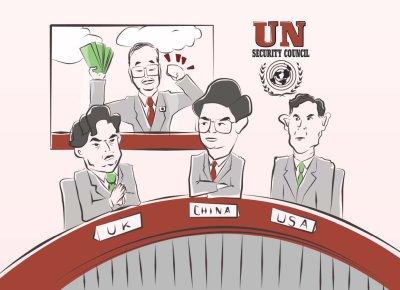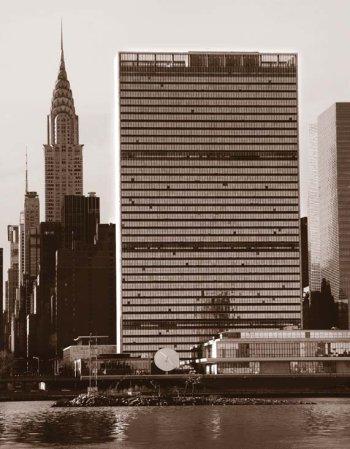Can Japan Please Stand Up?
Japan’s bid for a UNSC permanent seat: pipe dream or viability?
By Willhemina Wahlin and Dr Kaoru Natsuda
There seems to be one point agreed on by almost everyone when it comes to the United Nations Security Council: It’s a time capsule of the post-World War II global power structure, hardly representative of the 21st Century political landscape, and reform is badly needed. But here the consensus comes to an abrupt halt. The sticking point: everyone seems to want an expansion of the permanent seats available, but no one can seem to agree on how many, and to whom the honor should be bestowed upon—and why. Japan has long been campaigning for permanent membership of one of the most exclusive clubs in the world, but it has an uphill battle ahead if it is to convince its closest neighbors that it deserves one. But the real question is, does anyone really deserve a seat?
 By SHANE BUSATO
By SHANE BUSATO
Why does Japan deserve it?
Japan joined the United Nations in 1956, and in 1957, released its Diplomatic Blue Book, which focused on a UN-centered type of diplomacy. While over the years this has ebbed and flowed, its diplomacy at times being more aligned to the US than the UN, the fact remains that Japan’s contributions over the last 60 years to both the UN budget and Official Development Assistance (ODA) throughout the world has been consistent and highly praised. Even its hostile relationships with Beijing and Seoul have been tempered with yen loans or development projects.
Japan is trying to offer something unique to the peacekeeping efforts of the world. Historically the only nation in history to have suffered a nuclear attack—a fact that resides deep in the consciousness of Japanese people and in many ways, reinforces the notion that peace must be upheld. On top of this, Japan’s recovery from the ashes of World War II was unprecedented, and this experience, many Japanese leaders believe, is highly beneficial for other postwar nations. Importantly, Japan believes that its experience in disaster relief is also much needed, and this could well prove all too true as global warming is predicted to increase the unpredictability of weather around the globe, and Japan’s particular skills in disaster prevention will no doubt be much needed.
 The UN headquarters: New York
The UN headquarters: New York
But why does Japan need a permanent seat to continue this work? According to former permanent representative and Ambassador of Japan to the Conference on Disarmament, Kuniko Inoguchi, it’s not merely contributing to world peace that counts, it’s having access to information. Inoguchi wrote once that, in order to target aid more effectively, Japan needs access to accurate information. She adds: “The UNSC, as a place where all sorts of security-related information converges at all times, is just such an arena, and Japan needs to be part of the discussions carried out there.” She argues that this is why Japan has fought harder than most countries to be elected to non-permanent seats throughout the years and staggeringly, Japan and Brazil are the only two nations to have secured such seats eight times without gaining permanent membership.
Japan’s argument that it deserves a seat based on its consistent economic contributions also has some weight. It contributes more each year to the UN budget than four of the P5 (permanent five: China, Russia, the US, France and Britain) put together. For many years, it has consistently been the number two contributor to the UN budget, behind the US. In comparison, France accounted for just 6.03%, China 2.05%, and Russia only 1.10% in 2005. But Japan’s contributions have been dropping, from 19.5% in 2006, to 16.6% in 2008, and there is some speculation that it is not only Japan’s domestic economy that’s the cause.
Trouble in the neighborhood
The fact that Japan’s contributions have been slipping may well be tied to its failed bid for a UNSC permanent seat in 2005. In the same year, Japan sent its special envoy, Secretary for Foreign Affairs and member of the Japanese parliament Katsuyuki Kawai, to Nepal, seeking backing from Kathmandu for their bid. In a report for Korean Ohmy News, Kawai was quoted as saying: “If Japan loses its bid this time, Japanese people will think the support Japan has been providing to the world for the last 60 years has been futile.”

But Japan’s neighbors do not want to let it have a permanent seat. Korea and China both blocked Japan’s bid in 2005, citing a lack of historical reflection regarding its war atrocities. Polls run in Chinese newspapers succeeded in garnering over 10 million votes against the Japanese bid, according to the China Daily newspaper. At the time, former Prime Minister Junichiro Koizumi’s visits to the controversial Yasakuni Shrine, combined with the textbook fiasco, sparked protests in the two countries, and hardly helped to bolster Japan’s case. One would think, if Japan was serious in its bid for the UNSC seat, it would think twice about antagonizing its neighbors, especially if one of them has the power of veto!
However, China’s veto of Japan’s bid goes deeper than the old wounds. China’s first working paper on UNSC reform stated that it wanted to see more developing countries being considered for permanent seats. But according to an article in the Summer 2006 edition of the Harvard International Review, China’s use of its veto to maintain its singular representation of the Asian region signals some danger for global politics. “A political monopoly would endanger not only the new regionalism but also the legitimacy of the UN as an international organization. The interests of an entire region cannot be promoted by a single country, especially a region as economically and politically diverse as Asia.”
If not Japan, then who?
There’s one important question that has been raised about the very nature of permanent seats: why should they exist at all? Won’t all this energy be better spent on a complete reform that would lead to a more useful institution entirely?Japan has been part of a group called the G4 for a number of years now, and although its unity is waning, the four countries—Brazil, India and Germany included—have been using it as a way to back each other’s bid for permanent seats, if reforms make them available. But each has its opponents: China against Japan, Italy against Germany, Mexico against Brazil and Pakistan against India. And there are reasons why each country should and shouldn’t be awarded them. For instance, why should India get a seat if it is not party to the non-proliferation treaty? Importantly, why is Japan backing India’s bid at all, based on its own non-proliferation agenda? So, this begs the question: why should anyone get permanent seats? Not a single country is entirely free of diplomatic entanglements and historically sticky predicaments. Although the G4 have proposed two permanent seats for Africa, the latter have been unable to agree upon which of them should be the permanent two.
In the end, there are too many double standards in the process, and it’s obvious that talk of reform will carry on for much longer yet—far too long for most. The fact that a permanent seat in itself is a highly undemocratic notion was not lost on the countries that voted against the G4’s bid in 2005. For Japan, 2008 marks some renewed vigor in its campaign, as countries such as Australia give fresh support. But one has to wonder, won’t all this energy be better spent on a complete reform that would lead to a more useful institution entirely? JI
Dr Kaoru Natsuda is an Assistant Professor of Development Economics at Ritsumeikan Asia Pacifi c University, and previously worked with Ernst & Young Shin Nihon’s ODA department in Tokyo.
Willhemina Wahlin is a staff writer with J@pan Inc magazine.





